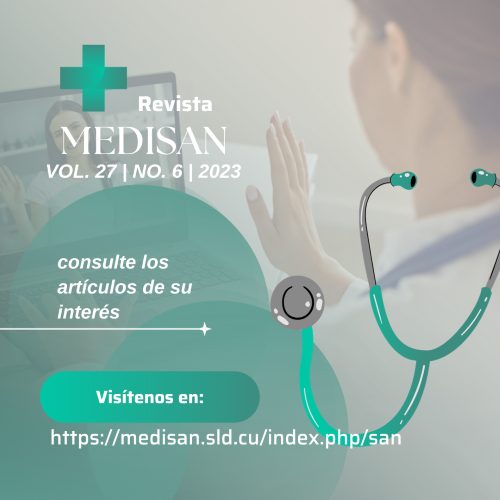Digital skills and technostress in university professors aged 60 years and over
Keywords:
distance education, faculty, technostress, professional competence, computer literacy, elderly.Abstract
Introduction: Limitations in the use of technologies in higher education professors lead to social isolation and exclusion and prevent the demonstration of professional skills.
Objective: Describe digital skills in elderly university professors and their relationship with technostress.
Methods: A qualitative study was carried out, from May to November, 2022, of 19 professors aged 60 years and over from San Luis Gonzaga National University in Ica, Peru. To this purpose, a training workshop was developed and the understanding of 6 theoretical-practical tools of teaching category in the teaching learning process was evaluated through the implementation of activities (questionnaire, chat and tasks) on the online platform Moodle. Likewise, the aim was to mark the identification criteria of training research and, for grading, 3 scoring intervals were established. A survey was applied based on the demonstration of digital skills and the emotional state concerning technology.
Results: The mean value of score was 14.73±0.42 and the following percentages were obtained for each score interval: I) 57.9; II) 31.6 and III) 10.5. Also, 73.7% required technical assistance to interact with virtual teaching, while 84.2% were overwhelmed with the use of technology. There was a correlation (p=0.0256) between the score assigned in digital skills and technostress.
Conclusions: University professors over 60 years of age showed deficiencies in the digital skills, which led to the appearance of technostress.Downloads
References
2. Backfisch I, Lachner A, Stürmer K, Scheiter K. Gelingensbedingungen beim Einsatz digitaler Medien im Unterricht – Kognitive und motivationale Voraussetzungen von Lehrpersonen. Tübingen: Tübingen University; 2021. p. 73-86 [citado 16/01/2023]. Disponible en: https://publikationen.uni-tuebingen.de/xmlui/bitstream/handle/10900/111259/TuSE02_vielfaltig_03-01_backfisch.pdf?sequence=1&isAllowed=y
3. Bitakou E, Ntaliani M, Demestichas K, Costopoulou C. Assessing Massive Open Online Courses for Developing Digital Competences among Higher Education Teachers. Educ. Sci. 2023 [citado 12/08/2023];13(9):900. Disponible en: https://www.mdpi.com/2227-7102/13/9/900
4. Heuling LS, Wild S, Vest A. Digital competences of prospective engineers and science teachers: A latent profile and correspondence analysis. IJEMST. 2021 [citado 27/04/2023];9(4):760-82. Disponible en: http://files.eric.ed.gov/fulltext/EJ1319179.pdf
5. Yang B, Huang C. Turn crisis into Opportunity in response to COVID-19: Experience from a Chinese university and future prospects. Studies in Higher Education. 2021 [citado 06/03/2023];46(1):121-32. Disponible en: https://doi.org/10.1080/03075079.2020.1859687
6. Souchet AD, Lourdeaux, DL, Pagani AP, Rebenitsch L. A narrative review of immersive virtual reality’s ergonomics and risks at the workplace: cybersickness, visual fatigue, muscular fatigue, acute stress, and mental overload. Virtual Reality. 2023 [citado 07/08/2023];27:19-50. Disponible en: https://link.springer.com/content/pdf/10.1007/s10055-022-00672-0.pdf
7. Wrede SJS, dos Anjos DR, Kettschau JP, Broding HC, Claassen K. Risk factors for digital stress in German public administrations. BMC Public Health. 2021 [citado 05/07/2023];21:2204. Disponible en: https://bmcpublichealth.biomedcentral.com/articles/10.1186/s12889-021-12247-w
8. Dinu E, Vătămănescu EM, Stăneiu RM, Rusu M. An Exploratory Study Linking Intellectual Capital and Technology Management towards Innovative Performance in KIBS. Sustainability. 2023 [citado 06/08/2023];15(2):1356. Disponible en: https://www.mdpi.com/2071-1050/15/2/1356
9. Coman C, Tîru LG, Meseșan-Schmitz l, Stanciu C, Bularca MC. Online Teaching and Learning in Higher Education during the Coronavirus Pandemic: Students’ Perspective. Sustainability. 2020 [citado 06/08/2023];12(24):10367. Disponible en: https://www.mdpi.com/2071-1050/12/24/10367
10. Monteiro A, Mouraz A, Dotta LT. Veteran teachers and digital technologies: myths, beliefs and professional development. Teachers and Teaching. 2020 [citado 05/07/2023];26(7-8):577-87. Disponible en: https://doi.org/10.1080/13540602.2021.1900809
11. Cabero Almenara J, Romero Tena R, Palacios Rodríguez A. Evaluation of teacher digital competence frameworks through expert judgement: the use of the expert competence coefficient. J. New Approaches Educ. Res. 2020 [citado 15/04/2023];9(2):275-93. Disponible en: https://naerjournal.ua.es/article/view/v9n2-9
12. Janeš A, Madsen SS, Saure HI, Lie MH, Gjesdal B, Thorvaldsen S, et al. Preliminary results from Norway, Slovenia, Portugal, Turkey, Ukraine, and Jordan: investigating pre-service teachers’ expected use of digital technology when becoming teachers. Educ. Sci. 2023 [citado 19/07/2023];13(8):783. Disponible en: https://www.mdpi.com/2227-7102/13/8/783
13. Laufer M, Leiser A, Deacon B, Perrin de Brichambaut P, Fecher B, Kobsda C, et al. Digital higher education: a divider or bridge builder? Leadership perspectives on edtech in a COVID 19 reality. Int J Educ Technol High Educ. 2021 [citado 14/07/2023];18(1):51. Disponible en: https://educationaltechnologyjournal.springeropen.com/articles/10.1186/s41239-021-00287-6
14. Cook H, Apps T, Beckman K, Bennett S. Digital competence for emergency remote teaching in higher education: understanding the present and anticipating the future. Education Tech Research Dev. 2023 [citado 01/08/2023];71:7-32. Disponible en: https://link.springer.com/content/pdf/10.1007/s11423-023-10194-4.pdf
15. Aditya Sulistiawan D. Embarking digital learning due to COVID-19: Are teachers ready? J Technol Sci Educ. 2021 [citado 22/08/2023];11(1):104-16. Disponible en: https://www.jotse.org/index.php/jotse/article/view/1109/501
Published
How to Cite
Issue
Section
License
All the articles can be downloaded or read for free. The journal does not charge any amount of money to the authors for the reception, edition or the publication of the articles, making the whole process completely free. Medisan has no embargo period and it is published under the license of Creative Commons, International Non Commercial Recognition 4.0, which authorizes the copy, reproduction and the total or partial distribution of the articles in any format or platform, with the conditions of citing the source of information and not to be used for profitable purposes.





